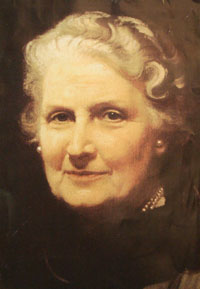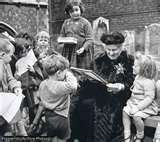About Montessori
At Glen Abbey Montessori School, we fully embrace the Montessori philosophy and all the principles. We do so, not only by providing our students with the requisite Montessori materials but also, by creating an emotional, social, developmental, and physical environment designed specifically to cater to the “Absorbent Mind”.
So, what exactly is the Montessori method? Glen Abbey Montessori School’s motto “The key to independence, respect and confidence” captures the essence of Montessori, where the classroom environment and teachers are there to guide students in becoming independent, to respecting themselves, others, and the environment, while practicing self-confidence.
Please take some time to familiarize yourself with the Montessori philosophy and its principles. A reading list has been created, to enhance your understanding of the Montessori method.

The Montessori Philosophy
The Montessori philosophy can be found within the writings of Dr. Maria Montessori:
“Ours was a house for children, rather than a real school. We had prepared a place for children, where a diffused culture could be assimilated, without any need for direct instruction… Yet these children learned to read and write before they were five, and no one had given them any lessons. At that time it seemed miraculous those children four and a half should be able to write, and that they should have learned without the feeling of having been taught.
 We puzzled over it for a long time. Only after repeated experiments did we conclude with certainty that all children are endowed with this capacity to ‘absorb’ culture. If this is true- we then argued- if culture can be acquired without effort, let us provide the children with other elements of culture. And then we saw them ‘absorb’ far more than reading and writing: botany, zoology, mathematics, geography, and all with the same ease, spontaneously and without getting tired.
We puzzled over it for a long time. Only after repeated experiments did we conclude with certainty that all children are endowed with this capacity to ‘absorb’ culture. If this is true- we then argued- if culture can be acquired without effort, let us provide the children with other elements of culture. And then we saw them ‘absorb’ far more than reading and writing: botany, zoology, mathematics, geography, and all with the same ease, spontaneously and without getting tired.
And so we discovered that education is not something which the teacher does, but that it is a natural process which develops spontaneously in the human being. It is not acquired by listening to words but in virtue of experiences in which the child acts on his environment. The teacher’s task is not to talk, but to prepare and arrange a series of motives for cultural activity in a special environment made for the child.”
Dr. Maria Montessori, The Absorbent Mind
One of the main philosophies, of the Montessori method, is to allow children to discover and learn for themselves, at their own pace. The children are guided in a carefully prepared environment, by their Guides/Teachers. Pure Montessori does not only focus on academics but aims in developing the “Whole Child.” Not only do the children learn how to read, write and perform mathematical equations, but they are also exposed to “culture” such as the world around them, the environment, different cultures, music, and arts. The Montessori method also promotes respect for self as well as for others in the world around them, independence, and self-confidence. This creates a foundation for our young leaders, where they develop the characteristics to become good citizens of the world thereby developing a deep love for learning.
The Principles of Montessori
No two Montessori schools are alike. At Glen Abbey Montessori School, we take care to ensure that the principles of Montessori are respected and upheld. As we closely follow the principles of Montessori, Glen Abbey Montessori School is an accredited member of the Canadian Council of Montessori Administrators. Below you will find a brief description of the Montessori principles, and how our school meets these principles.
The Prepared Environment
Glen Abbey Montessori School classrooms have been carefully designed, in order to meet the needs of our students. They are prepared environments, meaning that the furniture is scaled to the size of the child, and the materials are carefully displayed on open shelves that are easily accessible and inviting to our students. The materials are arranged in such a way as to capture your child’s interest, and help him/her learn independently.
Personalized not Generalized
Children develop at different rates, and they learn in different ways. The Montessori philosophy complements individual development as the teacher is meant to guide children according to their interests and different levels. At Glen Abbey Montessori School, we take pride in the fact that we have the ability to guide our students by focusing on each child’s unique personality and learning preferences. This is extremely important for young students within the age range of 2.5 years to 6 years old. We are able to provide this service due to our low student-teacher ratio of 1:8.
Cooperative, not Competitive
The Montessori method encourages a cooperative, rather than a competitive environment. At Glen Abbey Montessori School, students are not graded, as each child works at their own pace. We always encourage our students to “do their best, and not to determine who is best”. Cooperation, and a sense of community, rather than competition, sets the environment. All students are guided and encouraged to perform at their highest level while respecting and celebrating the good work of others.
Freedom and Discipline
Dr. Maria Montessori developed her method of teaching from many years of observation and experience, and she discovered that unless children had self-discipline they could not have freedom, but in the same vein, if you did not allow them freedom, self-discipline could not exist. Therefore, as a result, it is our goal at Glen Abbey Montessori School, to instill self-discipline in your child, and give him/her opportunities for freedom of choice.
Exposure to their World
We choose to introduce your child to all aspects of life, from reading, writing, and math to biology, science, and geography, diversity of cultures, music, arts, and drama. Within the varied fields, we present and explore activities that develop coordination, fine motor skills, and concentration. Having a multicultural classroom encourages our children to be well-rounded individuals, teaching them to be tolerant, peaceful, and respectful role-models in our diverse community. This meets the Montessori principle of developing the “whole” child and forms the foundation for the development of good citizens of the world.
